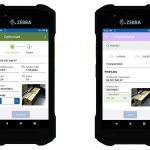SICK has pioneered the addition of IO-Link to two of its most compact and industry-standard identification devices. Both the SICK CLV61X fixed-mount 1D bar code reading scanner and the RFU61X UHF RFID read/write device were first to market with IO-Link variants, enhancing the integration versatility of SICK’s identification portfolio.
Both the SICK CLV61X and the RFU61X are already well known for their compact dimensions and wide-ranging connectivity with standard communications interfaces. The addition of IO-Link opens up opportunities to configure edge integrations with other IO-Link sensors and IO-Link Masters. It promises to improve data transparency from the lowest field level right up to the Cloud.
With IO-Link, using either device for identification also presents an opportunity to reduce cabling significantly, lowering costs and enabling more efficient installation. IO-Link also facilitates rapid commissioning, as well as easy device replacement.
IO-Link Integrations ‘Make Sense’
“It is rare for identification devices to be used in isolation,” explains Darren Pratt, SICK’s Market Product Manager for Identification. “They are almost always used with presence detection sensors for triggering or measurement sensors for classifying or measuring. Such sensors now frequently use IO-Link to provide access to additional data for diagnostic purposes. So, it makes sense for the customer to use IO-Link for their identification devices, too. Using IO-Link results in a common interface infrastructure with low-cost plug-and-play cabling, while still providing access to diagnostic data and enabling configuration via the communications network.”
Both the CLV61X and the RFU61X already offer highly-versatile connectivity with Ethernet/IP and PROFINET protocols, and an option for a single Power-over-Ethernet connection. Both devices offer a direct connection option for a trigger sensor.
Excellent Reading Performance
THE CLV 61X’s is used in many industries thanks to its highly-reliable 1D code reading performance across a wide reading field even at short distances, ideal for many common identification tasks on a conveyor belt. With SMART620 code reconstruction, even damaged, contaminated and partially-obscured barcodes are read consistently. Some CLV61X variants come with integrated heating in order to work reliably even in deep-freeze environments down to -35 °C.
Compact and Rugged
The smallest industrial UHF RFID read/write device of its kind, the SICK RFU61X needs an installation space of just 80 x 92 x 38 mm and achieves an impressive scanning range up to 0.5metres. The innovative design of the SICK RFU61X combines in-built antenna, intelligent control and connectivity into a single, rugged, IP67 aluminium housing. Compact and economic integration into tight spaces is therefore assured because there is no need for a separate connection box, and cabling is minimised.
The SICK RFU61X is ideal for applications such as tracking of smaller parts, sub-assemblies and electronic components, materials handling in e-Kanban processes, identifying pallets on a roller conveyor, or monitoring consignment transfers onto smaller Automated Guided Vehicles and Carts.
Off-Site Configuration Options
Pratt concludes: “The choice of identification device depends very much on the individual applications, with RFID devices offering a solution in dirty and dusty environments, where direct line-of-sight is obscured or where identification data needs to be both written and read. Increasingly, operators are choosing to have a section of conveyor configured off-site, including barcode scanners, RFID and photocells. With these two IO-Link devices, the wiring concept can be much more straightforward so on-site installation and commissioning is much quicker and easier.”
The post IO-Link for Auto-ID Devices appeared first on Logistics Business® Magazine.

